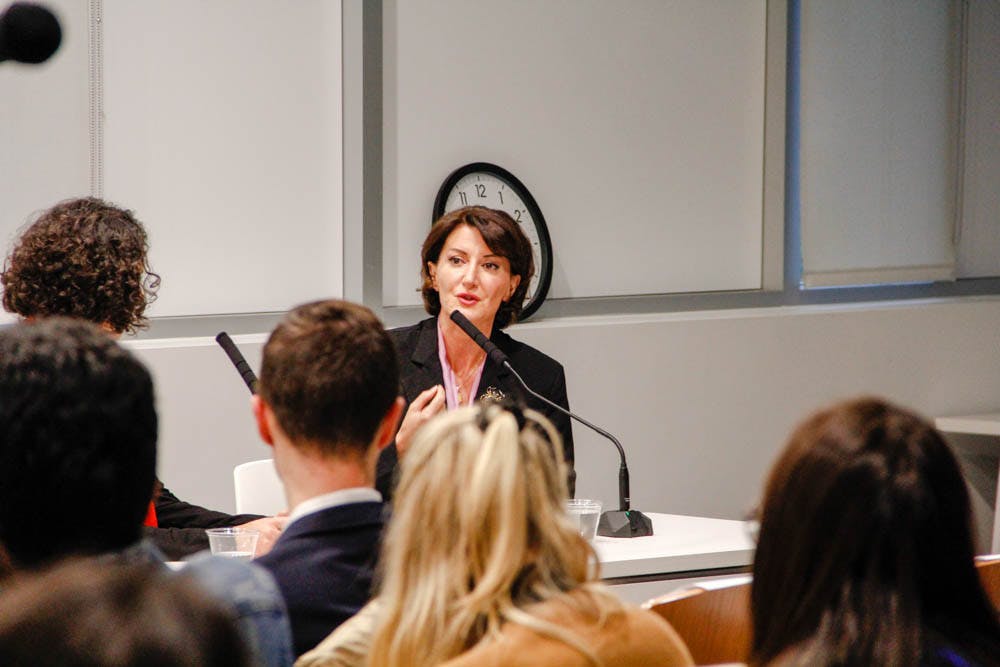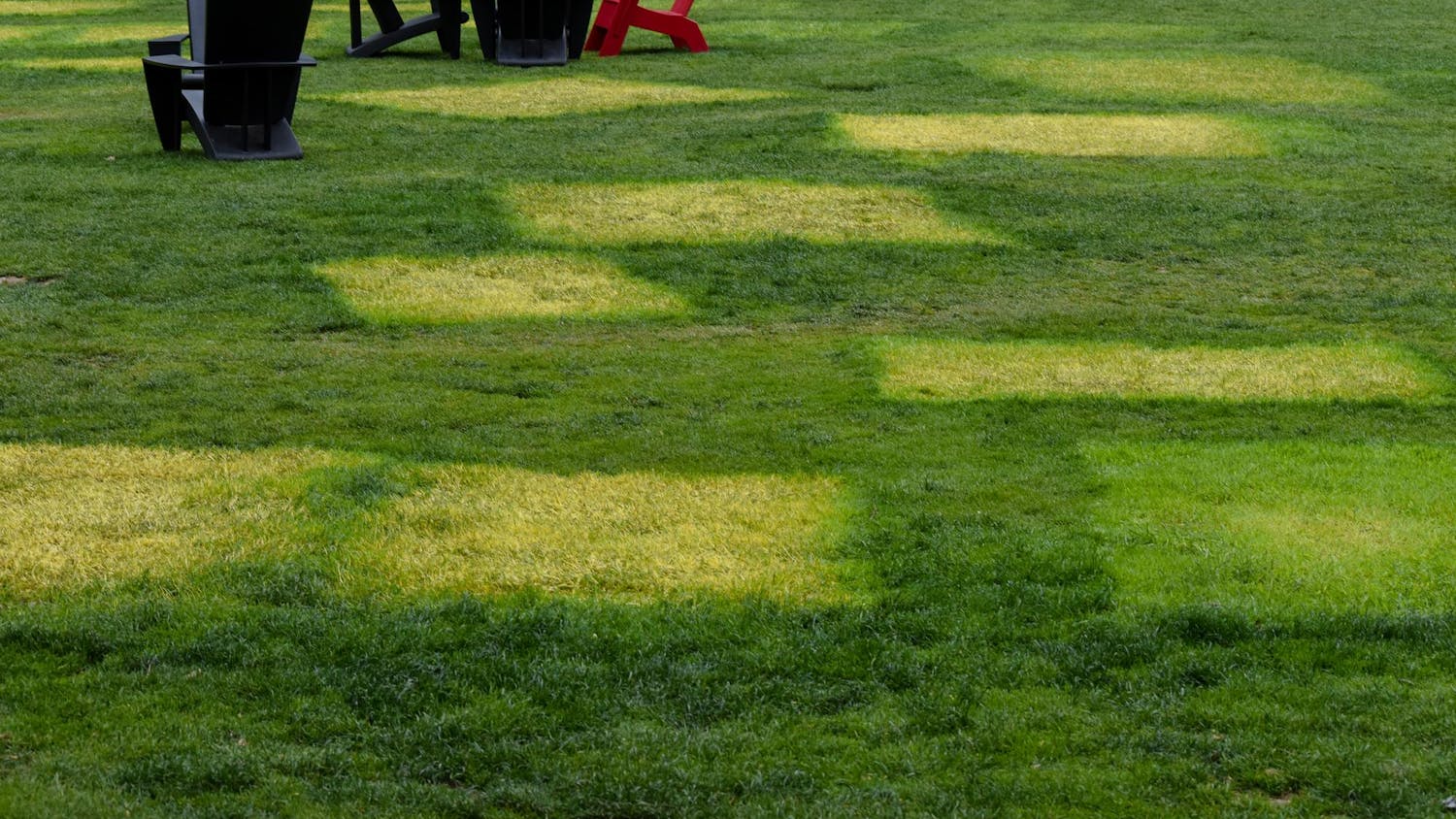For as long as she can remember, former President of Kosovo Atifete Jahjaga has fought against people and institutions that have excluded her because of her gender.
In a lecture as part of the Watson Distinguished Speaker Series — jointly presented by the Brown Journal of World Affairs and the Watson Institute for International and Public Affairs — Jahjaga spoke about her work cracking the glass ceiling as a Deputy General Director of the Police of Kosovo and ultimately breaking it as the youngest female world leader elected to the highest office.
In 1989, a violent war broke out between Kosovo and Serbia that involved “ethnic cleansing, massive killings, imprisonment, beating and rape” by police, who were “used as a tool of war,” Jahjaga told The Herald. The war “left very deep consequences and very open wounds” for Kosovo, even 20 years after its conclusion. In 2008, Kosovo declared independence from Serbia, although Serbia does not recognize Kosovo as a sovereign state. Shortly before Jahjaga’s election in 2011, after former head of state Behgjet Pacolli’s appointment to the presidency was ruled unconstitutional, the country “was almost in the age of civil war,” she told The Herald. Her talk at the University was arranged as part of the BJWA’s plan to cover the Kosovo War in its upcoming issue, wrote co-Editors-in-Chief Jonah Shrock ’20 and Isabel Alexiades ’20 in an email to The Herald.
Jahjaga’s interest in politics began when she studied law at the University of Pristina. As a young lawyer who graduated in 2000, a year after the end of the Kosovo war, she decided to join the police organization in an effort to change the people’s fear of law enforcement at the time. She wanted to help the people of Kosovo see the police as “there to serve them and protect them.” As one of the few women in the police force, Jahjaga also sought to change the perception of the role of women within the organization. In the past, policing was “not deemed an appropriate job for the women,” Jahjaga told the audience.
In her lecture, Jahjaga said that she was expected to prove herself in the police force by “playing by the rules of man and acting masculine.” But unlike some of her peers, Jahjaga was not ready to change her behavior, personality or appearance to adjust to a “masculine workplace.” In one of her first initiatives, Jahjaga suggested that the Kosovo police force should allow its officers to wear skirts if they please, “to make them feel comfortable in their own skin.” Jahjaga felt this change was one of her first cracks in the glass ceiling.
Based on her service and integrity in the police force, Jahjaga was nominated for the Kosovo presidency in 2011. Within 24 hours of her nomination, she was elected. While she was initially hesitant about taking on the role, she decided to accept the nomination. “I was used to throwing punches at the glass ceiling and cracking it, but this was my opportunity to crack it all the way.”
Jahjaga told The Herald that she finds power by repeating the same sentence to herself: “There is nothing in this world that cannot be done.”
As a child, Jahjaga would have never pictured herself becoming president because of the patriarchal nature of her society. But despite Kosovo’s male-dominated culture during her upbringing, Jahjaga found courage from her family to fight against gender norms. She told The Herald that she was lucky to have a father who did not raise her and her brother differently because of their genders. “He maybe even empowered me more than my brother,” Jahjaga said. “I’m forever grateful for the way he trusted me.”
She later used her platform as president to empower women and support survivors of the rampant sexual violence that was used as a weapon during the Kosovo war. 20,000 women and men were raped during wartime, a strategy that was meant to “emasculate the men of Kosovo and shame the women,” Jahjaga said at the lecture. “While we’re enjoying liberty, freedom (and) independence” from Serbia, “in the hearts and minds of survivors of sexual violence, war is still among themselves.”
During her time as president, she devoted her energy to challenging the stigma that still remained around trauma from sexual violence. She believes that formal prosecution is the only way for the region to recover from that trauma, but it has been impossible to make Serbia cooperate in legal proceedings. “We need a legally binding resolution that will keep countries accountable and responsible for everything that has been done,” she said.
When asked if she had advice for University students looking to get into politics, Jahjaga said, “Don’t hesitate. Do it.” But she also emphasized the importance of never compromising “the values you stand for, because then you don’t know what you stand for.”
At the end of her lecture, Jahjaga asked Erza Ajeti ’22, a student from Kosovo, to stand up. Ajeti teared up as Jahjaga told the audience that the next president of Kosovo may be among them. To Ajeti, Jahjaga’s lecture about breaking the glass ceiling mattered because “that’s exactly what she did for me.”
“A big reason why I’m studying International Relations at Brown is because I had a female role model as president when I was growing up. I never grew up thinking that was not something I could do,” Ajeti said. “She’s definitely one of the most remarkable women not only in Kosovo but worldwide. Her work continues to be an inspiration, not just for me, but for every single girl in Kosovo.”





